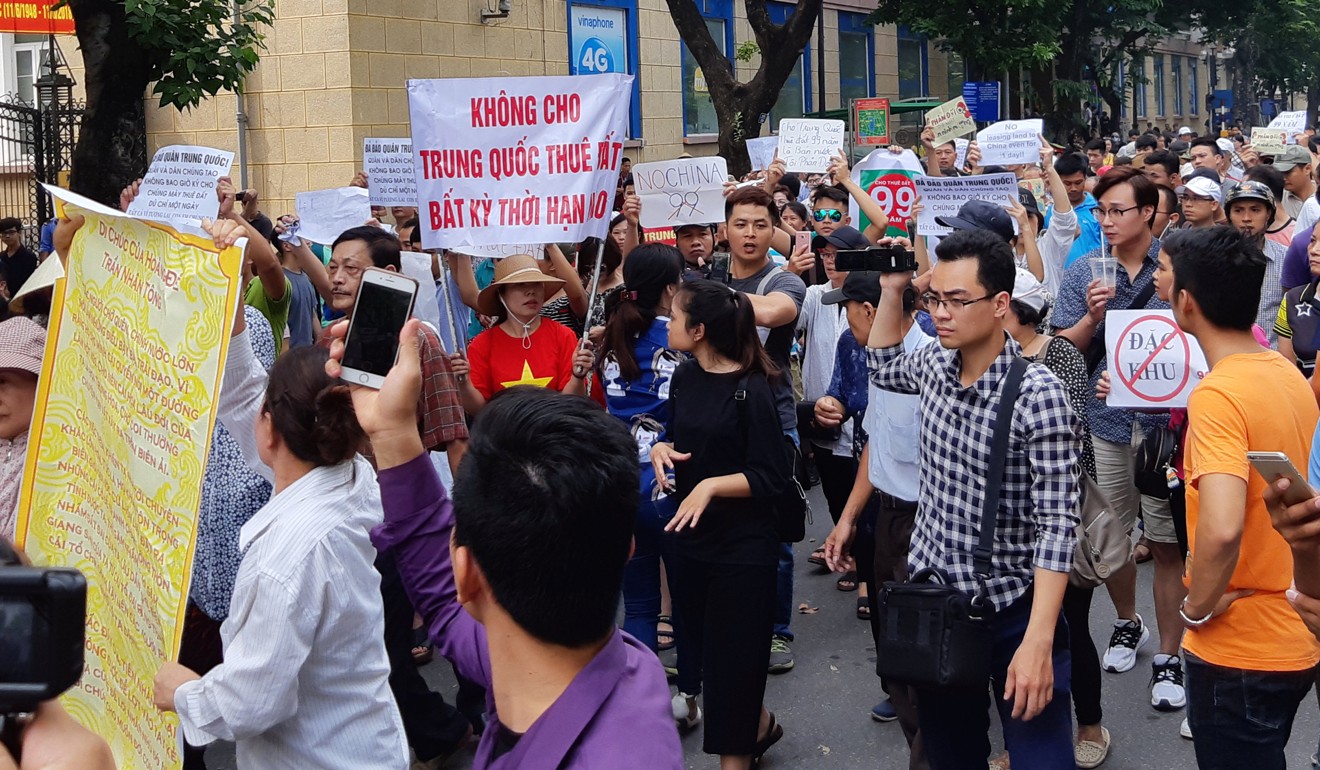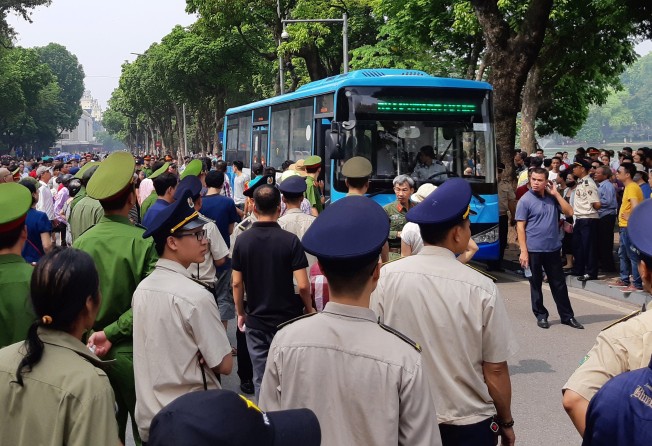
Vietnam tries to contain anti-China protests as plan for new economic zones sparks anger
Public anger mounts over a proposal to grant companies lengthy land leases, which some view as sweetheart deals for foreign and specifically Chinese firms

Police in Vietnam detained more than a dozen protesters in the capital Hanoi on Sunday and halted demonstrations in other cities against plans for new special economic zones that the protesters fear would be dominated by Chinese investors.
Vietnam said in May last year it planned to open three special economic zones that offer investors greater incentives and fewer restrictions than available in the country at present.
The draft law does not identify potential foreign investors that can lease land for up to 99 years in the zones, but the protesters fear it will be dominated by neighbouring China.
The demonstrators carried anti-China banners, including one that said “No leasing land to China even for one day”, on a busy street near Hanoi’s Hoan Kiem Lake.
An AFP correspondent saw plain-clothes police drag around 20 people away and move them into nearby buses.
Authorities could not be reached for comment.

The incident followed the arrests of two people on Saturday in a southern part of the country for spreading leaflets calling for protests against the legislation, state media reported.
Images on social media also showed demonstrations in Ho Chi Minh City and other parts of Vietnam, as calls for action spread on Facebook last week.
It was not clear if other protesters had been detained.
The government said on Saturday that it had asked the National Assembly to delay a vote on the draft law to allow for more research on the legislation.
There are many protests in several cities & provinces throughout #Vietnam against #SEZs & #CybersecurityLaw. pic.twitter.com/n6D1hYEZoz
— Anh Chí (@AnhChiVN) June 10, 2018
“The bill is designed to give a strong boost to the development of three special administrative and economic units, including Van Don in Quang Ninh province, Bac Van Phong in Khanh Hoa province and Phu Quoc in Kien Giang province, and room for institutional experiments,” the government said in a statement.
Today, in southern Vietnam, people protested everywhere to protest the Vietnamese government's approval of the bill for Chinese businesses to lease land in three special economic zones in #Vietnam. pic.twitter.com/LvJACEuuOG
— Linh Lan (@LinhLan76704617) June 10, 2018
The initial draft law had said land in the zones could be leased for up to 99 years, but Prime Minister Nguyen Xuan Phuc told local media last week the term would be reduced, although he did not say for how long.
The protests come at a time of rising tensions over the disputed South China Sea, nearly all of which is claimed by China.
HOT: Wave of online protests sweeps over #Vietnam in opposition to planned legislation (June 15) that will let foreigners lease Vân Đồn, Phú Quốc, Vân Phong for 99 years and turn them into Special Economic Zones. Many call it a backdoor for China and an act of treason. pic.twitter.com/ggC1NNi9aR
— Saigonese (@VietNamTweeter) June 6, 2018
Vietnam is among several countries in the region that have claims in the South China Sea, through which an estimated US$5 trillion in trade passes each year.
Demonstrations turned violent in 2014 following China’s deployment of the Hai Yang Shi You 981 oil rig in the South China Sea, with at least 21 killed and 100 injured in clashes targeting Chinese-owned factories, although many were owned by firms from other countries.
The government has since cracked down on anti-China protests, but it remains publicly opposed to the nine-dash line and China’s presence in the Paracels and Spratlys.
Nguyen Chi Tuyen, a Hanoi-based dissident blogger with 42,500 Facebook followers, said he rarely saw such public interest in the National Assembly, a legislature that usually acts as a rubber stamp for the Communist Party’s Central Committee.
“This time they’ve got a lot of attention from the people, not just activists or dissidents but the normal people,” he said, adding that anti-China sentiment has fuelled anger.
Public shows of dissent are rare in the one-party state, where a conservative leadership in place since 2016 has taken a more aggressive stance against activists.
A Vietnamese environmental activist was jailed for 14 years in February over protests against a toxic waste dump that killed tonnes of fish in 2016, an incident that sparked nationwide demonstrations.
Reuters, Agence France-Presse